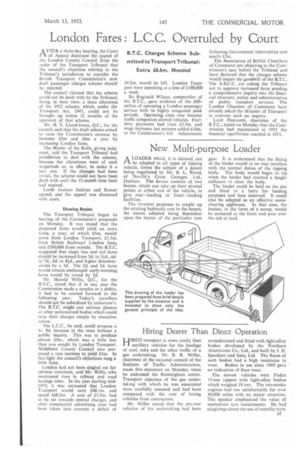London Fares : L.C.C. Overruled by Court
Page 41

If you've noticed an error in this article please click here to report it so we can fix it.
B.T.C. Charges Scheme Submitted to Transport Tribunal: Extra £6.6m. Needed
AFTER a three-day hearing, the Court of Appeal dismissed the appeal of the London County Council from the order of the Transport Tribunal that the council's objection relating to the Tribunal's jurisdiction to consider the British Transport Commission's new draft passenger charges scheme should be rejected.
The council claimed that the scheme could not be dealt with by the Tribunal, being, in their view, a mere alteration of the 1952 scheme, which, under the Transport Act, 1947, could not be brought up within 12 months of the approval of that scheme.
Mr. H. V. Lloyd-Jones, QC, for the council, said that the draft scheme aimed to raise the Commission's revenue by between £5m and fkm a year by increasing London fares.
The Master of the Rolls, giving judgment, said the Transport Tribunal had jurisdiction to deal with the scheme, because the alterations were of such magnitude as, in effect, to make it a new one. If the changes had been trivial, the scheme could not have been dealt with until the 12-month time limit had expired.
Lords Justices Jenkins and Romer agreed, and the appeal was dismissed with costs.
Hearing Begins The Transport Tribunal began its hearing of the Commission's proposals on Monday. It was stated that the proposed fares would yield an extra Lora. a year, of which £5m. would come from London Transport, £1.1m. from British Railways' London lines, and £500,000 from outside. The B.T.C. suggested that single bus and rail fares should be increased from 3d. to 30., 6d. to 7d., 8d, to 80., and higher denominations by a ld. The 2d. and 5d. fares would remain unchanged: early-morning fares would be raised by 2d.
Mr. Harold Willis, Q.C., for the RTC., stated that if in any year the Commission made a surplus or a deficit, it had to he carried forward to the following year. Today's travellers should not be subsidized by tomorrow's. The B.T.C. might cast envious glances at other nationalized bodies which could raise their charges simply by executive action.
The L.C.C., he said, could propose a Is. 9d. increase in the rates without a public inquiry. This was to produce almost £5m., which was a little less than was sought by London Transport. Middlesex County Council also proposed a rate increase to yield £3m. In this light the council's objections rang a little false.
London had not been singled out for adverse treatment, said Mr. Willis, who mentioned rises in railway and road haulage rates. In the year starting mid1953, it was estimated that London Transport would earn £68.1m. and spend 168.2m. A sum' of £5.5m. had to be set towards central charges, and after commercial advertising rates had been taken into account a deficit of £4.2m. would be left. London Transport were operating at a loss of £100,000 a week.
Sir Reginald Wilson, comptroller of the B.T.C., gave evidence of the difficulties of operating a London passenger service with its highly congested peak periods. Operating costs rose because traffic congestion slowed vehicles. Fuelduty payments had risen £5.5m. and wage increases last autumn added £18m. to the Commission's bill. Adjustments following Government intervention cost nearly £2m.
The Association of British Chambers of Commerce are objecting to the Commission's case before the Tribunal and have declared that the charges scheme would impair the goodwill of the B.T.C. The A.B.C.C. are asking the Tribunal not to approve increased fares pending 'a comprehensive inquiry into the financial structure, policy and administration of public transport services. The London Chamber of Commerce have already asked the Minister of Transport to convene such an inquiry.
• Lord Hurcomb, chairman of the B.T.C., stated on Monday that the Commission had maintained in 1952 the financial equilibrium reached in 1951.




















































































